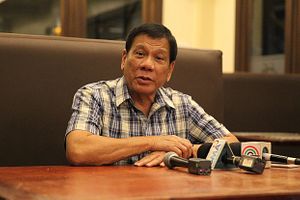When it comes to gender and sexuality diversity rights and equality in Southeast Asia, the Philippines tends to be an outlier on several aspects relatively speaking. Activists work hard, and rightly so, to further the agenda, but in many ways start well ahead of their colleagues in neighboring countries. A scandal and the ensuing debate this week in Quezon City shows we may be inching further toward greater protections for LGBT Filipinos.
Gretchen Custodio Diez, a 28-year-old trans woman, was arrested by Quezon City police after entering a women’s bathroom at a local mall. She had been reported by a woman janitor to the mall’s security staff, who then escalated the situation. Diez livestreamed the incident to Facebook, with the video showing the janitor allegedly hurling transphobic insults at her. Diez as then arrested, taken for a medical examination and threatened with ‘unjust vexation’ charges laid by the janitor.
“I will file a complaint against the mall management because of the humiliation I suffered,” Diez has since said. Farmer Plaza general manager Morriel Abogado later apologized to Diez in a statement, adding “We also would like to extend the apology not just to the LGBT community but to the public in general for the actions of said crew member.”
Geraldine Roman, a former journalist who became the country’s first openly transwoman elected to Congress in 2016, has taken up her cause. While colleagues in the Senate pondered if it’s a danger to women to allow trans women to enter gender-segregated bathrooms, Roman slammed the asides as offensive and “absurd.”
The incident itself and the ensuing public relations disaster and domination of the news cycle reveals the limitations of regional anti-discrimination measures and the gap between progressive and conservative Filipinos.
Historically, the Philippines, like much of the rest of the region, was home to some communities which celebrated or quietly accepted same-sex relationships and less restrictive gender roles. That changed with colonization and the spread of Catholicism and other imported religions. More recently, the Catholic church’s enduring influence and conservative lawmakers have moved to legislate against recognition of same-sex marriages and civil unions performed overseas. But unlike regional neighbors — and despite conservative influence — the Philippines has remained a broadly pro-equality outlier in Asia.
The Philippines ranked 10th most gay-friendly country in the world as part of The Global Divide on Homosexuality study from Pew Research in 2013. It found 73 percent of adult Filipinos agreed that “homosexuality should be accepted by society” and while those numbers are now six years old, it is a nine-point improvement from the last result in 2002 demonstrating a leap-frogging trend. Still, more recent polling specifically looking at support for marriage equality shows far fewer Filipinos in support, with just 22 percent backing the move.
Progressive, pro-LGBT equality Filipinos have found a seemingly unusual supporter in President Rodrigo Duterte. Despite Duterte’s foul-mouthed nature – including recently declaring that he had been “cured” from being gay – some of the president’s policy positions on gender and sexuality equality have at times challenged those of many conservatives. For instance, while vice mayor of Davao City in 2012, he was instrumental in assisting a local council in introducing an anti-discrimination ordinance protecting the LGBT community. This ordinance was one of the first in the country and lead to others like that in Quezon City.
To be sure, one ought not to overstate this. For example, Duterte has flipped so frequently on support for marriage equality that it’s hard to define where he actually sits. His view on the matter appears to shift depending upon how he feels about the Catholic Bishops’ Conference of the Philippines on any given day. But when it comes to protections against discrimination, at least, he’s much firmer.
In response to the outrage following the Diez case, presidential spokesman Salvador Panelo confirms Duterte will support the passage of the SOGIE bill. The Sexual Orientation, Gender Identity, and Gender Expression bill first passed Congress in 2017 before being bogged down in the Senate. Panelo could not confirm if Duterte would demand the bill be fast-tracked through the Senate, in which he now enjoys near-total control, but noted Duterte’s previous supportive comments.
Could this finally be the moment movement happens? Activists have worked for years to bring LGBT equality to the forefront. Now with Roman in the Congress and outrage online keeping up the pressure, they might well clear the next hurdle. Whether or not they are able to do, however, remains to be seen.

































